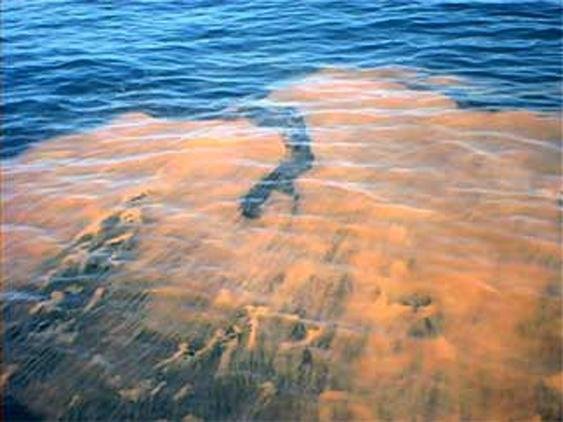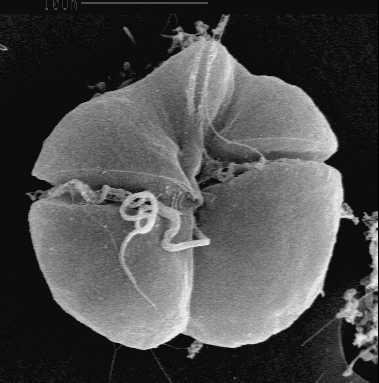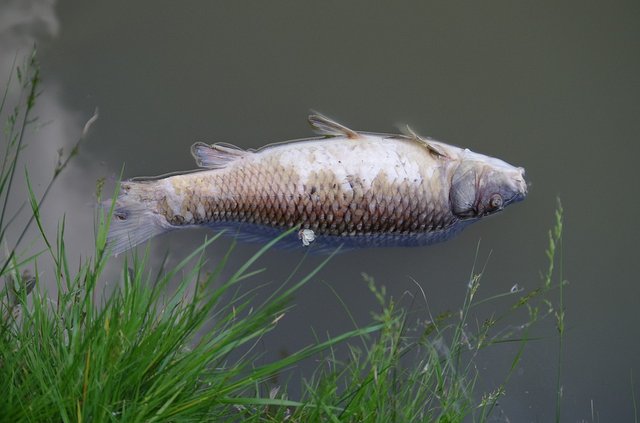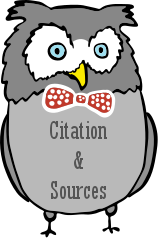Bizarre Natural Phenomena Vol. 49 - When The Seas Turn To Blood (Red Tide)
Don't be intimidated by the title, there will be no bloodshed on this post, I promise (?). What we're looking at today is an algal bloom phenomenon. Under right conditions algae population might increase over a specific area with harmful consequences.

Image from the Public Domain, source: commons.wikimedia.org
The Vegan Killer!
Ok, ok, I lied! This story is about an evil serial killer! You wouldn't believe that tiny little seaplants are capable of killing anyone, would you? I mean, they are so small, how would they ever manage to kill? Hellooooo! There is power in unity people, read on below...
Algae population can rise uncontrollably resulting in the release of harmful toxins in high amounts. In other cases this can just end up in oxygen depletion of the waters. Both effects seem deadly catastrophic for marine life (fish, birds and other creatures of the "afflicted" ecosystems) and unlucky people who may happen to consume affected seafood. The "killer's" nickname? Red tide. The term is not the most accurate naming, but it has prevailed in everyday language, especially in the USA. Its official name? HAB (Harmful Algae Bloom) [1].
The killer is nothing more than some phytoplankton species, dinoflagellates, which carry specific pigments resulting in the coloration of the waters they are found in. The colors range from red, brown and yellow [3], [4].

Dinoflagellate Karenia brevis - Image from the Public Domain, source: commons.wikimedia.org
The Execution Plan
This is not fully understood, but as the NOOA suggests after conducted studies, wind and water currents might lay the grounds for the overpopulation to take place. Another "accomplice" can be the nutrients (like phosphorus and nitrogen) from agricultural activities that end up in sea, river or lake waters. Other natural phenomena may also act supportively and they are floods, droughts, hurricanes. Moreover, unusually warm water temperatures caused by water pollution along the coasts and climatic changes are also thought to share part of the blame [1], [3].
The phenomenon is not limited to one region only and it is not uniform. In fact its appearance and intensity varies accordingly to the area due to the variability of geographical features and organisms that live in each place [1]. For example, in the Gulf of Main you will find the Alexandrium fundyense species taking over, whereas the Karenia brevis will rule over the Gulf of Mexico and make it all the way to Florida (therefore bearing also the name Florida red tide) [3], [4].
The Weapon
The algae kill with the toxins they release or by simply "eating out" the oxygen supplies of the waters. Either way, it's a bad, bad death. Karenia brevis produces powerful brevetoxins, these affect the nervous system and fish gills. They can be easily airborne affecting people breathing them in and causing respiratory problems that can persist for even several days. Toxin blooms may last from weeks to even months, whereas there have been rare reports when the toxins were present for a whole year (1995-1996 and 2005) [3], [4].
Some fish and sea animals die from poisoning, but there are others more resistant that end up to a poor fellow's dish. What if they eat contaminated fish or seafood? Neurotoxic shellfish poisoning is on its way. Gastrointestinal and neurological symptoms start occurring like diarhea, nausea, vomiting and even partial paralysis. The state of Florida has taken measures to prevent such incidents by monirtoring shellfish consumption and they have managed to prevent deaths by shellfish poisoning almost 100% [3].
You can check the wikipedia's list of the most important incidents recorded over the last 6 centuries in the relevant article.

Image source: pixabay.com - (CC0 license)
Where does it happen?
It is a worldwide phenomenon, but the US coasts seem to suffer more. Since we can end up mourning innocent victims (of the animal and the human kingdom), NOAA decided to work with NASA, the U.S. Environmental Protection Agency and U.S. Geological Survey in 2015. They have joined forces in order to collect satellite data, monitor and predict HAB occurrences. There is also the Phytoplankton Monitoring Network, along with a new technique asigned to test the waters with underwater devices and "ring the alarm" whenever the danger threshold is reached [1].
Are They All Sinister?
No! Not all algae work to smother or poison innocent sea creatures. In fact algal blooms are very very important and necessary in order to provide marine animals and fish with food [1].
References
[1] noaa.gov
[2] oceanservice.noaa.gov
[3] wikipedia.org
[4] accuweather.com

Thank you so much for your time!
Until my next post,
Steem on and keep smiling, people!


The Black Plague of the seas is called Red Tide
Ahaha! Exactly! :P
Here I was warming up for a good old horror tale only to be confronted by a harmless phytoplankton :)
Was that a challenge? Was that a challenge? 'Cause I'll be back with a short horror!!!!! :P
I looooooove a good horror story :)
I think I included phytoplankton in my "Plant Wars" series, but that's been like ... half a year ago. :D
A horror story? Can I have the link please?
It's available as a PDF in my Google drive, because it's way past payout so here you go https://drive.google.com/drive/folders/13vGdMACzOp_efDw_w618KVn9sNzFa2hm?usp=sharing
Ok. Thanks a lot. I will go through it later.
Aside providing marine life with food. They can be harnessed to give Biofuel. I read an article on that some time ago
The idea in general rings a bell but I can't remember where I heard it. That's a cool topic to look into, thanks for the input! :)
Is there a way to join the greek trail
The discord server and the facebook group. If you are not already there, I'll come back with links ;)
Thanks
https://www.facebook.com/groups/steemit.greece/?ref=bookmarks
As for the discord channel, contact @ otsouvalas and ask for an invitation ;)
Thanks I will do that
@ruth-girl, I am unable to contact @otsouvalas. Can you help
I lived on the coast for a long time. One thing which you didn't mention, and which text is entirely unsuited to describe is the smell of a red tide.
Was it that bad?! Thanks for mentioning it, I totally forgot about that!
It smelled terrible, and that's coming from someone who regularly works with landfill waste, sewage, and rotten food.
This sounds nasty yuks
At least you don't have to smell it anymore :)
We can thank agricultural runoff for the increasing prevalence of algal blooms.
Ahaa, thanks for being a great "sponsor" :P
Great post, @ruth-girl! I had not really read up on the dangers of red algae, but I've been to a few seminars about the dangers of cyanobacteria, and it seems like both of these do a lot of the same type of damage.
Algae can really be deadly killers under the correct conditions, and New Zealand has even seen had dogs who have died from swimming in rivers with algae blooms.
Thanks for the input and kind words @valth!
Those dog incidents are just sad :(
Yeah, it's very sad about the dogs. Luckily I have not seen any reports of the same incidents happening to children who wanted to taste the green water.
I think the green water looks a bit repulsive to children... hopefully!
Yeah, and I assume New Zealanders are teaching their children to be aware of the deadly green water.
Hopefully! Suesa said green algal blloms happen around her place too. It just sucks not being able to drink tap water or take a walk along the beach or river...
Oh yeah, that sounds pretty annoying. I bet it can even be difficult to find bottled water if everyone goes out to buy it at the same time. We've had some local algal blooms where I live as well, but it has luckily never affected any drinking water that I know of.
Looks like you've finally ventured into microbiology territory with your Phenomena (though you probably have before and I forgot). That means I've actually heard of this one before :P I don't have too much to add though. Just remember that if you see a bloom, get away from the water.
There have been so many phenomena, it's hard even for me to remember sometimes :P
But yes, I have talked about micro-organisms in the past (like in a post about bioluminescence and some colored lakes).
Right! Bloom = Run as far as you can ;)
Ευτροφισμος . Η πτυχιακη μου στο Πανεπιστημιο... Τι μου θυμισες τωρα ... :)
Ωωω, φαντάζομαι... ωραία χρόνια :)
Νταξει , οταν την γραφεις γαμωσταυριζεις , μετα οταν περναει ο καιρος λες ωραια χρονια ... :)
Ποσο δικιο εχεις! :D
I always wonder if myths about "rivers turning into blood" is just an attempt to explain, or even just a metaphor for, a bloom of red algae.
In Germany, we sometimes have HABs in summer, in some of the cities like Hamburg. People are then told to not go out and swim or even be careful with drinking water right from the tab. Of course, not everyone listens.
Although in this case, it's usually not red but blue green algae.
I think it should be the first one. People unable to explain the truth without the knowledge will always make up stories.
It must be scary though, not being able to go to the beach or drink tap water. Although the seafood poisoning sounds even scarier...
Content type: long, popular





Awarded 5 out of 6 owls:
Excellent job!
Details: The originality owl was not awarded since it requires that the science behind a phenomenon is explained in a creative/novel way.
Thank you @mathowl!! :D